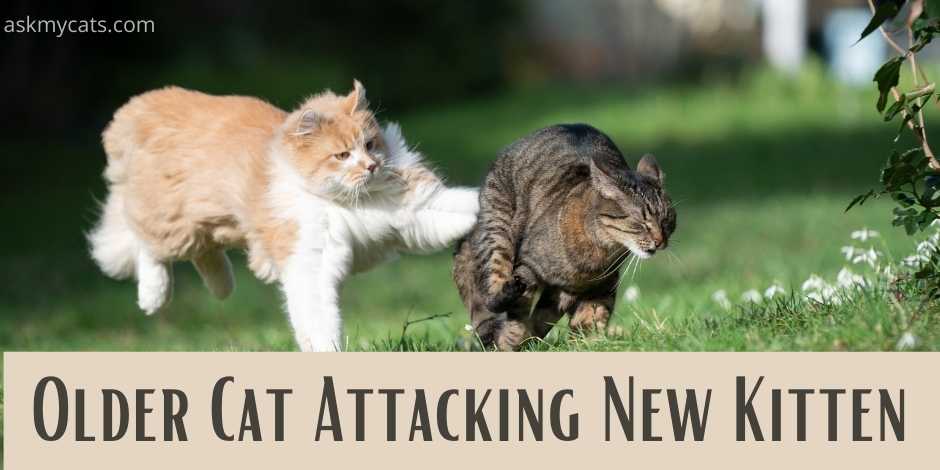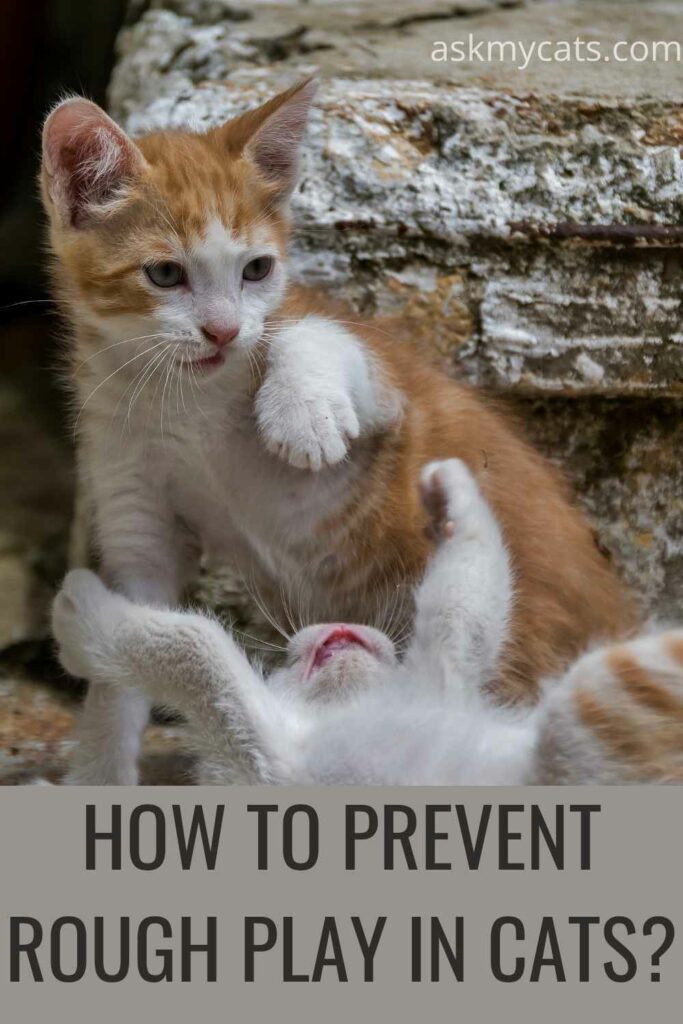You wanted a new companion for your cat but now you are extremely disheartened seeing the relationship they are ending up sharing?
Your older cat seems to be appalled by the new kitten and tries to attack every time they see you are away to not question your tactics?
My dear, I hear you, I see you.
Your older cat tries to attack your kitten whenever given the opportunity because they feel you have restricted yourself only to the new kitten and their time is now divided.
Which develops a sense of jealousy in which they end up showing aggression.
Below, I have got some topics for you that every cat parent should once get through.
Come on paw-rents, let’s dive right in.


Give Your Cat the Perfect Day
Get the Free Ebook!
Why My Cat Hates My New Kitten?
Your older cat is likely to hate your new kitten because they are very protective of their people and boundaries and you just tried to exert that for them.
Most probably, there is also a possibility that your old cat just isn’t familiar with having company around which makes them act socially awkward around the new kitten.
In this case, pay attention to the way they emote in front of the new kitten to lay some ground rules on what is accepted and what is not.
For a precise example, look if the cat is dilating its eyes, stepping a step back in order to attack, and hissing aggressively.
This needs to be the point where you take the new kitten and gently move away showing your discomfort in the situation, which could prevent any further mishappening.
Why My Older Cat Plays Rough With My New Kitten?
Your older is playing rough with your new kitten because they are depicting mock aggression. Some results have evidently shown that cats play roughly because of their breed attributes that as stalking, chasing, and pouncing on each other.
This also shows that your cat is showing the 2nd type of rough play which is social play, where your cat tends to include playful bites during the whole play session.
First is solidarity play.
This should also be kept in mind that cats are born hunters. They take a great deal of time to get used to people and also their fellow felines too.
Playing roughly isn’t a sign that it might hurt your new kitten, it’s the way they have learned to be around each other.
Healthy play will follow once they will have a mutual inclination toward each other.
Should I Let My Cat Play Rough With My New Kitten?
No, you should absolutely stop rough play once you know it’s getting out of hand. Make sure that the behavior that’s been taken out is consensual and the other one is not in fear or dilemma.
Not getting yourself in between in this case would ensure major health-related issues and fights that could lead to unfavorable situations.
Consider that cats have a high tendency to be rough being the natural hunters or prey.
Being extremely unsocial acts as a reason why they try to present themselves through rough tactics of play.
In this case, never force your cat to play with the new kitten when they haven’t been surrounded for a long time.
How To Prevent Rough Play In Cats?
Whenever you sit back reading a great book and your eyes wander to find your cat
You see, that your cat plays so rough that it would someday result in a deep injury and that question simply eats you alive?
Don’t you worry, I am lining up some pointers down below by which you would be able to somewhat break their habit of taking out such acts

1. Don’t Give Your Hands As Toys
The most common thing we do while playing with our cats is giving them access to our hands and sometimes faces to let them scratch and bite.
We take that as a form of love which to clear out is not.
They consider that as your acceptance towards any kind of rough activity they would carry out.
2. Give Adequate Play Materials
Give your cat enough toys to play with and ensure even there that playing rough isn’t acceptable.
Whenever they try to act roughly to get your site of attention, move gently so that they know this is something that will not get them any reward.
3. Spend Time
Your spending time with your cat will make you understand your cat’s triggers and their existing dominant nature.
You giving them time would make them confide in you eradicating the possibility of them venting out through rough play.
Is It Normal For Older Cat To Hiss At New Kitten?
Yes, it is absolutely normal for cats to hiss at the new kitten you just brought to the house. They carry out this behavior to scar way the new cat.
This may continue until the two become used to having each other around.
Introducing a new kitten to your cat is a hell of a task. Your older cat will be possessive of the territory and not be the center of attraction, which would propel them to hiss and growl seeing the new kitten.
This can be worrisome to many owners.
The only thing you can do while the unknown phase continues is to keep the older cat known as the kitten without forcing it on each other.
Organize play times and park walks together where you should be there to be cautious of the signs they render you.?
You might be interested to read about why do mother cats attack their kittens
When Will My Cat Stop Hissing At My New Kitten?
Your cat will stop hissing at your new kitten once it becomes sure that there is no harm in befriending the new kitten.
Hissing is an emotion a cat puts forward when it develops the fear of invasion in boundaries, and not being the only site of attention.
But I know, it can be stressful and exhausting to see and not be able to do anything about it.
Grab a chair, I have got some points that would make you a clearance that why the hissing is continuing even now.

1. They Consider Them As A Threat
Every now and then we discuss that cats are very territorial and fear their boundaries being snatched. In this case, until the cat ends with surety that there’s no harm, the hissing may continue.
2. Age Gap
Yes, people, you heard it right.
The hissing period also depends upon the age gap your cats are in.
Usually and mostly, older cats are less likely to accept younger cats that have high energies.
They consider them the major threats to their built persona in front of their owners which makes them less accepting of the new kitten.
3. Gender
Studies have evidently shown that a neutered male cat is far more welcoming towards other cats than others.
If you have put two females and unneutered males together that might be the main cause of the fires that have been inside your house.
You will also like to read about why is my cat biting her kittens
What Do I Do If My Cat Doesn’t Like My New Kitten?
Your cat doesn’t seem to like your new kitten because most cats that you own for a long time are very reluctant towards a new change and refrain from accepting most of them.
A new kitten is the last thing they would have wanted in their home.
I have brought some points on the things that you can do to end this unlikable period as soon as possible.

1. Don’t Coerce Them
Your forcing them on each other will only create a distance bridge between them.
There are high chances that they will end up feeling conscious and disliking each other more.
2. Devote Equal Time
Once your cat feels protected, secure, and loved.
There are fewer chances of it being unlikable to each other, for your cats, you are their whole world, especially the cats that have been with you for a long period of time, being loved erases their insecurities after which they become accepting towards everything around them.
3. Time Will Decide The Friendship
Your cat never asked for a companion. You have blessed it with one. But you cannot force your cat to start liking your new kitten.
They need to have a mutual understanding of that. As time passes by, they will feel like having each other complements them better which would eventually contribute to their friendship.
How Do I Bond My Cat With New Kitten?
You can bond your cat with your new kitten by encouraging their playtime together, rewarding their decent behavior towards each other, by once in a while playing with them and keeping them known to each other.
Remember, that they should feel like bonding with each other, you cannot act as a driving force between them.
In the initial stages, you need to know that their cat is in a denial state and would take some days to sit well with the fact that there is somebody else going to be there to divert your attention towards them.
Think of the new kitten too as it would also take some time to befriend you, the environment, and to know a friend who seems to not like its presence in the house.
Once all of this settles, you can reintroduce them again.
Also, check out the reasons behind kitten attacking older cat
Frequently Asked Questions
How to make my new kitten feel comfortable?
You can make your new kitten feel comfortable and secure by letting it choose its favorite spots and hiding places. Win their trust by giving them their favorite meals and providing them with a clean and sanitized environment.
Will my cat ever like my new kitten?
Yes, your cat will like your new kitten once they get out of their denial phase.
Cats are very less social which ensures that they take time in befriending anyone.
Patience is the key if you want to see your cat and kitten making it work.
Why my new kitten is not eating?
Your kitten is not eating anything like the surrounding you have offered them is unfamiliar.
The trust factor is also contributing to their actions in the given away.
More than that, keep a check on the food you are providing them, their likability towards it also sometimes be checked.
Final Words
Your older cats have fully accepted you and the home you have given them. We should always keep in mind that cats are very restrictive and hardly like to redefine their boundaries.
A new introduction to a kitten makes them prone to not accepting the new change and being dominant in nature because of it.
You can give them their own time without shattering their belief in you.
Coercing them would mean their distrust which would make them aggressive in nature.
At last, I would conclude by saying that have faith in time, both your cats will come along when given the appropriate time to accept their own reasons and differences.
